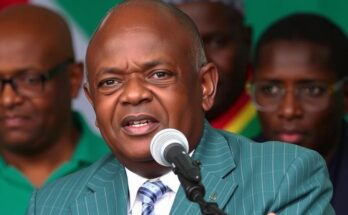Yamandu Orsi has won the presidential election in Uruguay, securing 49.77 percent of the votes against conservative candidate Alvaro Delgado’s 45.94 percent. His victory speech highlighted themes of freedom and equality, as he prepares to implement a moderate approach to governance. Both Delgado and President Luis Lacalle Pou have conceded and offered support for the transition. Orsi’s election is part of a global trend of declining support for incumbent parties, driven by public concerns over economic issues.
Yamandu Orsi, the candidate from the centre-left opposition in Uruguay, has been declared the winner of the presidential election. With 97 percent of votes counted, Orsi secured 49.77 percent while conservative Alvaro Delgado received 45.94 percent. In his victory speech, Orsi emphasized a vision of a country founded on freedom, equality, and fraternity, addressing thousands of supporters gathered in Montevideo. Following the results, both Delgado and the current president, Luis Lacalle Pou, conceded the election and expressed their willingness to assist Orsi during the transition period. The electoral outcome reflects a broader global trend of incumbent parties losing support in light of public dissatisfaction over inflation and economic issues. Orsi, having previously amassed 43.9 percent in the first round, plans to adopt a moderate “modern left” policy without drastic shifts, aligning with Uruguay’s historically stable political climate.
Uruguay, a nation of 3.4 million recognized for its political stability, beaches, and progressive social policies, has recently experienced electoral change with the election of Yamandu Orsi. Orsi’s victory signifies a return to centre-left governance amid facing economic concerns such as high living costs, inequality, and violent crime. This election occurs in a global context of incumbent parties losing support, particularly due to the economic pressures felt by voters. The political landscape in Uruguay is characterized by less polarization compared to neighboring countries, allowing for a more cooperative approach among moderate parties.
In conclusion, Yamandu Orsi’s election as the new president of Uruguay marks a significant shift towards centre-left leadership amidst a backdrop of economic concerns affecting voters worldwide. His commitment to modern left policies aims to reassure the populace of continuity and stability. The smooth transitions and collaborative spirit displayed by the outgoing leaders reflect Uruguay’s relatively tranquil political atmosphere, differentiating it from the highly polarized environments of other nations in the region.
Original Source: www.begadistrictnews.com.au




